Singapore police to launch AI chatbot to assist public in lodging reports
The AI chatbot will be available at self-help kiosks within seven police division headquarters from Oct 1.
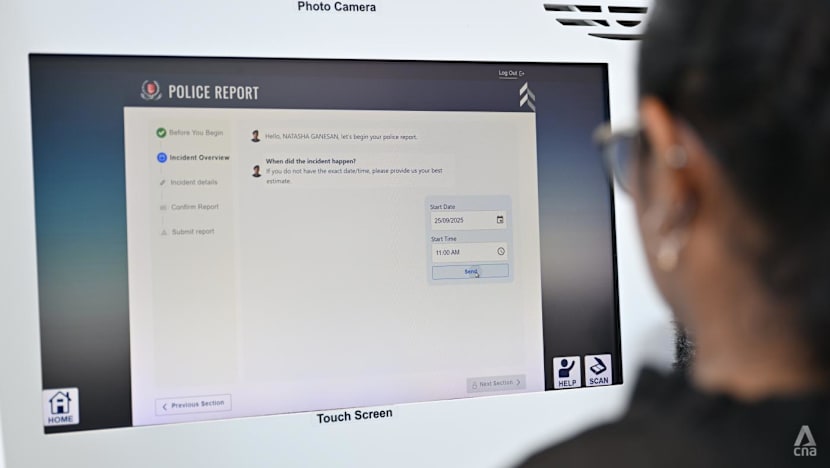
CNA reporter filling in details for a police report on the Singapore Police Force's AI-enabled chatbot, Report Lodging Co-Pilot (R-COP), at a self-help kiosk at the Woodlands Police Division, on Sep 26, 2025. (Photo: CNA/Raydza Rahman)

This audio is generated by an AI tool.
SINGAPORE: Starting Wednesday (Oct 1), members of the public will receive more guidance when lodging police reports, with the help of a new artificial intelligence (AI)-enabled chatbot.
Known as the Report Lodging Co-Pilot or R-COP, the Singapore Police Force (SPF) will launch the chatbot at self-help kiosks located within its seven police division headquarters, in collaboration with the Home Team Science and Technology Agency (HTX), the police said in a news release on Monday.
The seven police division headquarters are: Ang Mo Kio Police Division, Bedok Police Division, Central Police Division, Clementi Police Division, Jurong Police Division, Tanglin Police Division, and Woodlands Police Division.
Nine self-help kiosks across these division headquarters will have the R-COP feature; three of them will be located at Woodlands Police Division, while the remaining six will have one each.
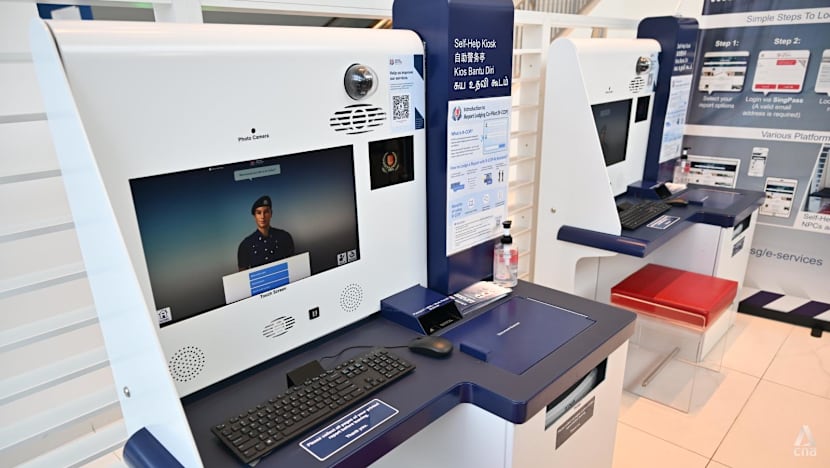

Currently, when lodging a police report at the self-help kiosks, members of the public may inadvertently leave out essential details as they may not be aware of the type of information needed by the police.
"As a result, investigation officers (IO) often need to make follow-up calls to them to clarify and gather further details, which takes up time for both the members of the public and the IOs," said SPF.
With the R-COP, the police aim to improve the report lodging experience and ensure that critical information is comprehensively and accurately captured at the point of reporting to reduce the need for follow-up calls, SPF added.
HOW THE AI-ASSISTED CHATBOT WORKS
Depending on the nature of the incident being reported, members of the public will be given various prompts to provide relevant details through a chatbot conversation.
The chatbot provides examples of incident details required. More guidance is also available for those making scam reports.
At the end of the process, a draft report will be generated for the person lodging the report for review and edits before it is submitted. Once that happens, an investigation officer will be assigned to the case.
Members of the media had the opportunity to test out the AI chatbot last Friday, ahead of its launch. CNA also gave the current reporting system a try to see how it differed from the new one.
We attempted to report a hit-and-run incident on both systems, but without explicitly calling it as such. We used phrases such as "another car banged into mine" and "took off without stopping".
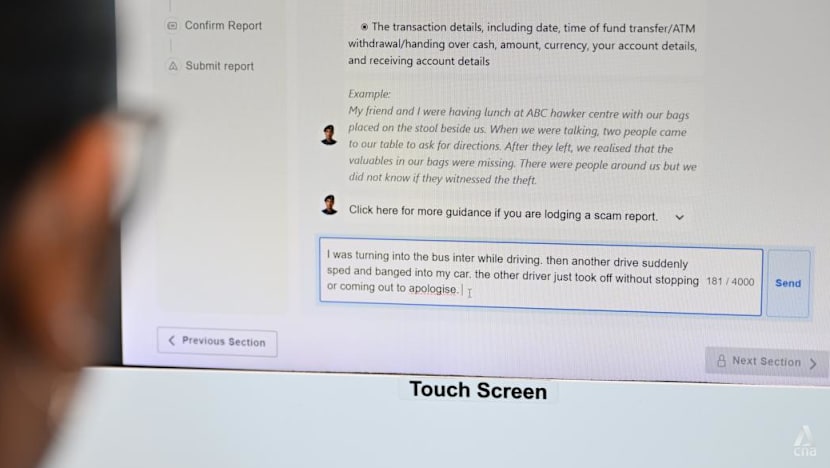

The current system asked for details of the suspect involved, such as their race, estimated height and even their hair type. As for R-COP, the AI prompted us to describe the item or property involved, including its brand, model and colour. It also asked if we were threatened or harassed during the incident, and whether there were closed-circuit television (CCTV) cameras nearby.
In our input to R-COP, we also keyed in spelling mistakes to see if the AI could pick them up.
In drafting the report, the current system used our description of the incident verbatim. Meanwhile, R-COP identified the case as a hit-and-run and switched out phrases in colloquial English - "banged into" - for those that were more formal - "collided".
For other types of incidents, the current system maintained the same set of questions while R-COP had different prompts. For example, when reporting a scam incident, the AI asked for the scammer's online details such as social media usernames.

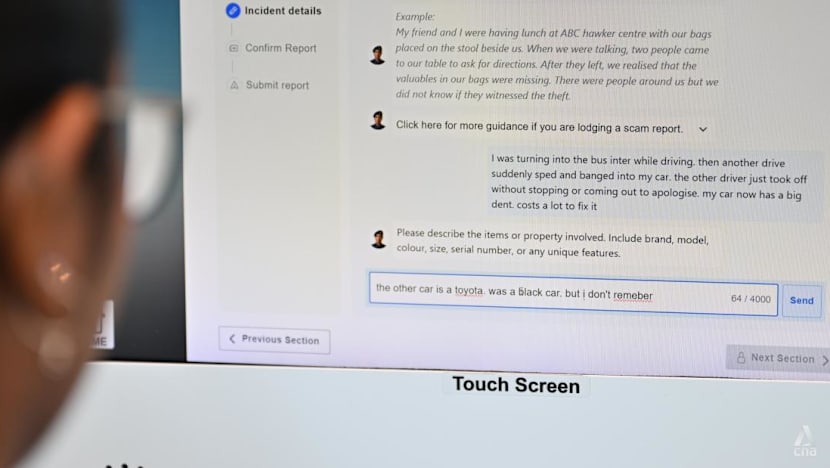
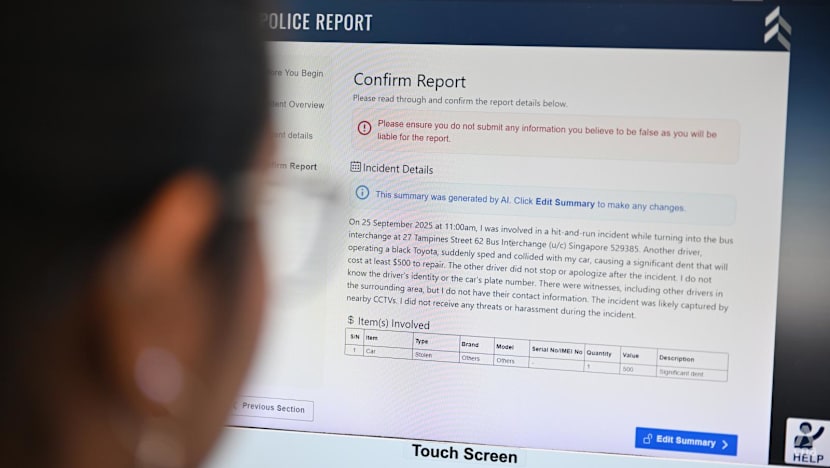
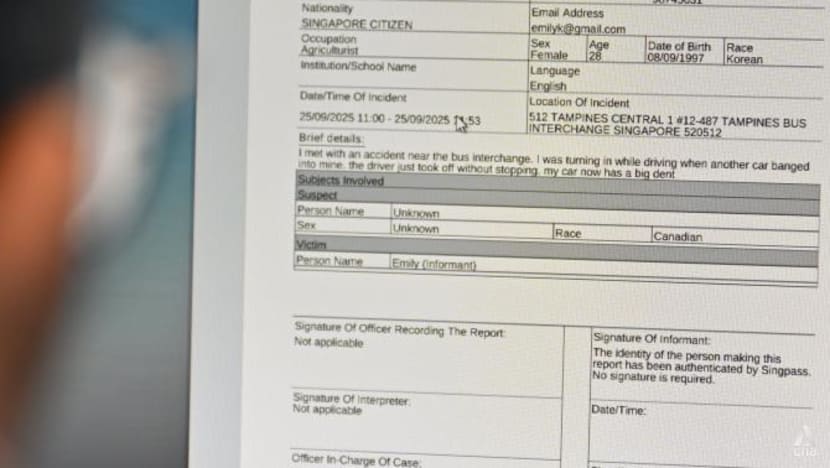
"RIGOROUS TESTING" TO REDUCE INACCURACIES
Data uploaded to the R-COP is stored on government servers and safeguarded in accordance with the public sector cybersecurity and data security requirements, the police said on Monday.
"As with any AI system, there may be occasional inaccuracies or unexpected responses, such as irrelevant questions or inaccurate information in the generated summary," they added.
To minimise such occurrences, the SPF and HTX implemented guardrails within R-COP's AI system and subject it to "rigorous testing".
Still, the police advised members of the public who use R-COP to carefully review the AI-generated summary and make the required corrections before submitting their report.
Police officers stationed at the division headquarters will assist those who face difficulties using the chatbot, said SPF. The public can opt out of using R-COP at the self-help kiosks if they prefer filing their report without it.
They can also choose to manually lodge their report with officers over the counter.















